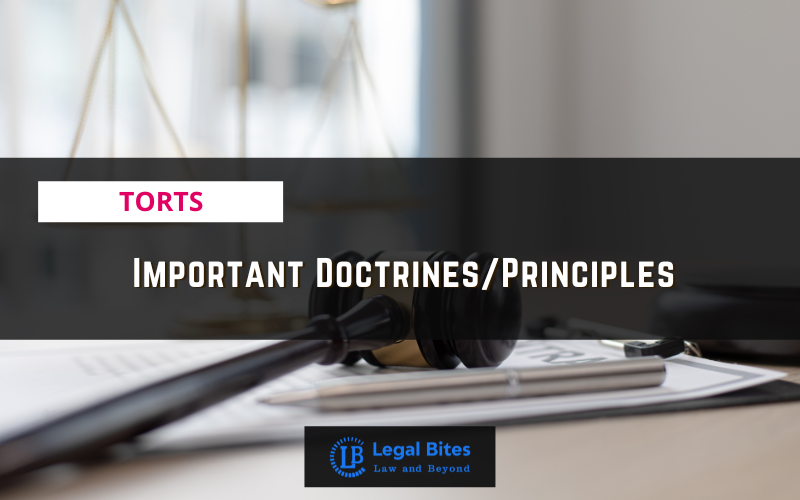Important Doctrines/Principles under Law of Torts
Read important Doctrines/Principles under Law of Torts only on Legal Bites.

This article titled ‘Important Doctrines/Principles under Law of Torts’ deals with various important doctrines and principles used in the Law of Torts along with brief descriptions. Important Doctrines/Principles under Law of Torts 1. Injuria Sine Damno Injuria sine damno means an infringement of rights without actual losses. Herein, liability can arise even if no person suffers actual or substantial losses, provided the legal right is violated. 2. Vicarious Liability The general...
This article titled ‘Important Doctrines/Principles under Law of Torts’ deals with various important doctrines and principles used in the Law of Torts along with brief descriptions.
Important Doctrines/Principles under Law of Torts
1. Injuria Sine Damno
Injuria sine damno means an infringement of rights without actual losses. Herein, liability can arise even if no person suffers actual or substantial losses, provided the legal right is violated.
2. Vicarious Liability
The general rule of tort liability is that the person who causes damage must pay compensation. In certain cases, however, liability can arise on third parties also. The law refers to this vicarious liability.
3. Volenti Non-Fit Injuria
This means that a person who knowingly and voluntarily risks danger cannot recover for any resulting injury.
4. Principle of Strict and Absolute Liability
In strict liability, any person can be made liable, whereas, in absolute liability, only an enterprise can be made liable (commercial objective). In strict liability, the escape of a dangerous thing is necessary, whereas, in absolute liability, an enterprise can be made responsible even without an escape.
5. Principle of Act of God
An act of God is a general defense used in cases of torts when an event over which the defendant has no control over occurs and the damage is caused by the forces of nature. In those cases, the defendant will not be liable in law of tort for such inadvertent damage.
6. Composite and Contributory Negligence
In the case of contributory negligence, a person who has himself contributed to the extent cannot claim compensation for the injuries sustained by him in the accident to the extent of his own negligence; whereas, in the case of composite negligence, a person who has suffered has not contributed to the accident but the outcome of a combination of the negligence of two or more other persons.
7. Concept of Joint Tort Feasors
Joint tortfeasors are those who have mentally combined together for the same purpose. To be. considered joint tortfeasors, the parties must act together in committing the wrong or their acts, if. independent of each other must unite in causing a single injury.

Paras Ahuja
Paras Ahuja is a law graduate from National Law University, Jodhpur (2022). She has graduated with Constitutional Law Honours and takes a specific interest in gender laws and labour laws.

